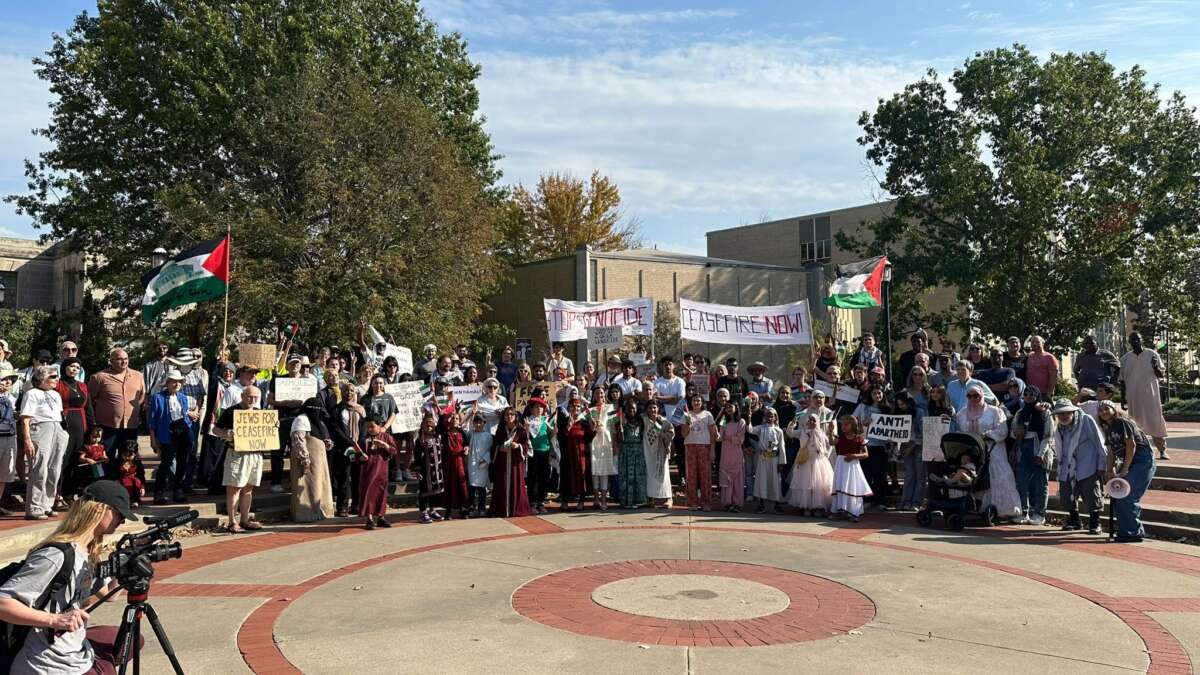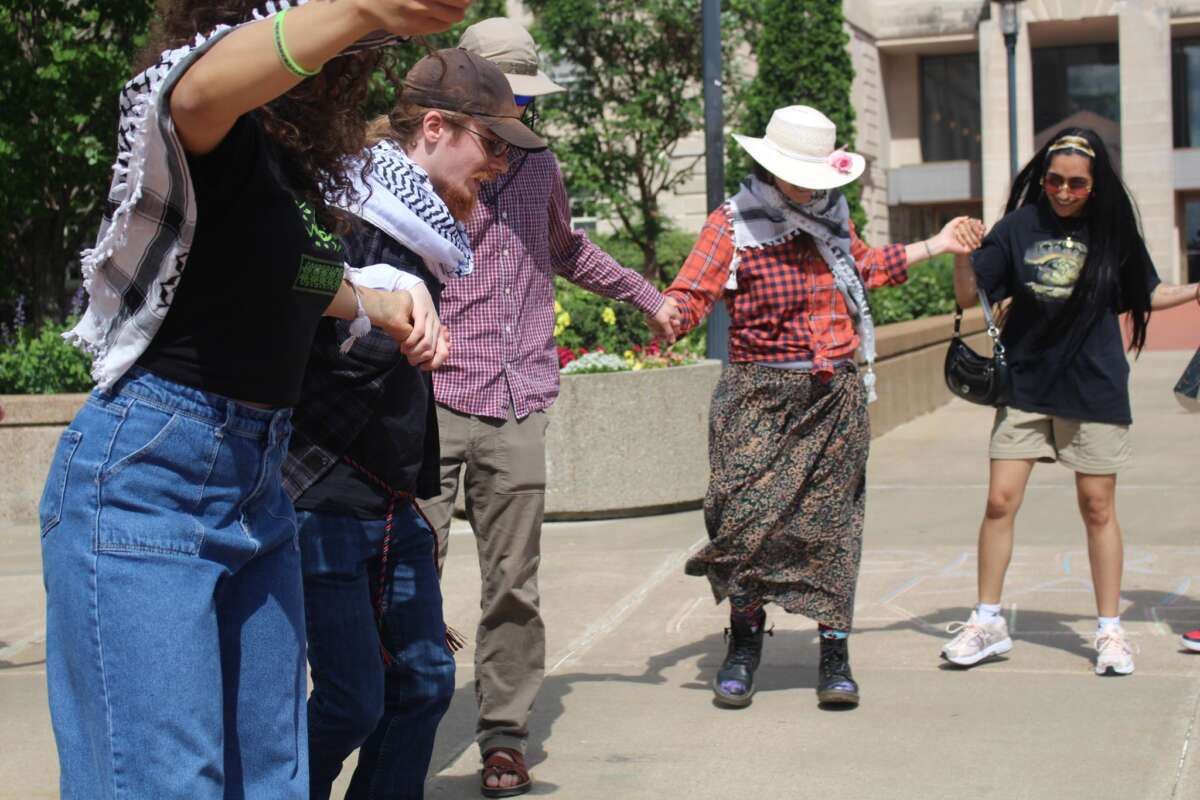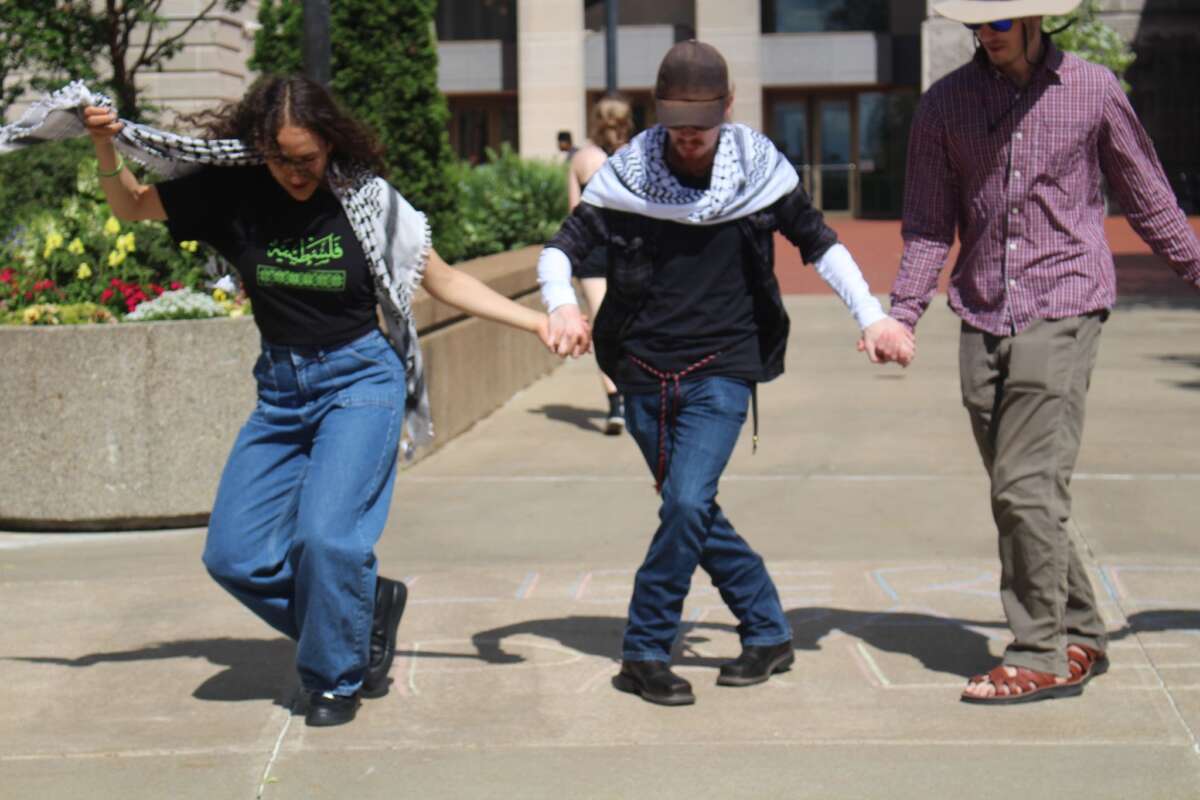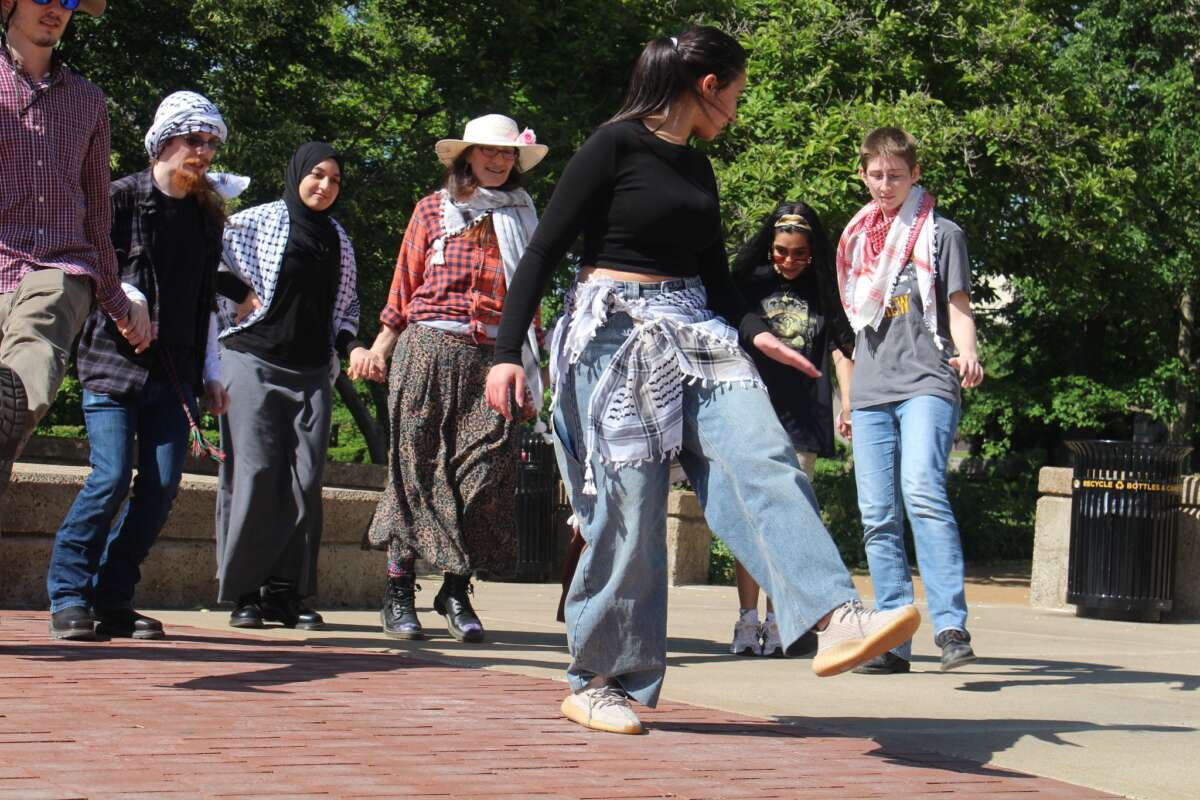Part of the Series
Struggle and Solidarity: Writing Toward Palestinian Liberation
Honest, paywall-free news is rare. Please support our boldly independent journalism with a donation of any size.
It’s been an unjust start to 2025 for members of University of Missouri’s Students for Justice in Palestine (MSJP).
On New Year’s Day, another group on campus, the Mizzou College Republicans, spread a fabricated image, purported to be from MSJP, in a social media post online. The image falsely claimed to be a screenshot of a statement from MSJP celebrating Shamsud-Din Jabbar, the attacker who drove his car into a crowd in New Orleans on New Year’s Eve, killing 14 people before police eventually killed him. In addition to the fabricated image, the social media post from the College Republicans included commentary from the group’s president, Brenden Poteet: “I demand that Mizzou’s administration take action in condemning Mizzou Students for Justice in Palestine and disciplines the students who published this hateful, racist post,” he wrote. Poteet, a freshman, claimed he found the fake image on YikYak, a campus social media network where posters are anonymous. He published it on multiple platforms within hours of the killings in New Orleans’ French Quarter.
Leor Shomroni, a Mizzou grad student who is one of MSJP’s seven board members, told Truthout the meme’s inauthenticity should have been a no-brainer. “You don’t have to even think about it that hard,” he said. “It doesn’t match anything else we post, not to mention the shitty language in it, or the shitty photoshop job, and the message.”
Even so, the post about the fabricated image was picked by the Boone County Republicans, a local (non-college) Republican group that promoted it on their various social media platforms. Comments on their post as well as the College Republicans’ post were brutal. Some advocated for the university to withdraw scholarships and access to visas, falsely presuming the majority of MSJP participants are foreign-born.
MSJP president Isleen Atallah described the comments as “blatantly racist, Islamophobic, and hateful.” In contrast, the MSJP community has “been consistently protesting violence, fighting for justice and an end to the occupation in all its forms.”
The crude language in the fabricated image “is not something their members would ever say, or even think,” Atallah said.
Though the College Republicans have received considerable scrutiny in local press accounts, MSJP says the administration’s only public statement took the form of an ambiguous comment left on several social media postings where the fake image was amplified. They wrote: “We strongly condemn violence of any kind. We are investigating this matter with the seriousness and urgency it deserves.”
University spokesperson Christopher Ave confirmed in an email to Truthout it had reached its conclusion, writing: “The university has investigated the matter and found no evidence that MSJP made such a posting on social media.” He did not say whether they’d investigated how the Mizzou College Republicans came to create and share the post in the first place.

Poteet has since expressed regret for the post, calling it “hasty,” but “without malicious intent.” He’s publicly apologized, retracted and deleted the offending posts, and is hoping for grace, telling Truthout, “I was as cooperative as possible to show my sincerity. I’m ready to move forward.”
Atallah wasn’t persuaded by the apology. “I don’t think xenophobia and Islamophobia are mistakes,” she said, pointing out how those strands of the post from the College Republicans posed a specific threat to the group’s members. “We stand for Palestinians, and most of our members are Arab or Muslim.” The MSJP maintains that a fuller discussion must be had, one that includes university executives. How can MSJP move forward, Atallah asks, without receiving the vital information and assurances that they need to safeguard their members?
Shomroni says sincerity is not the issue; with or without malice, the actions of the College Republicans put a target on their backs. Moving forward without accountability is not an option for them, nor should it be for University of Missouri President Mun Choi. “The post labels us as terror sympathizers. It invites incitement, it invites actual violence toward us,” Shomroni said. “I want consequences from the university toward the College Republicans for being so reckless.”
Shomroni and Atallah said they’re left to consider the degree to which the university is complicit in “turning them into a collection of controversies” and diminishing their budding reputations and future life prospects. In their view, Mizzou’s response in the comment threads helped the posts gain traction, giving credence to the outrageous claims in the fabricated post.

For the last two years, Atallah has guided the organization through rough patches in an increasingly hostile campus culture. A low point came in October, when Choi barred MSJP from participating in Mizzou’s homecoming parade with a dabke dance, questioning the group’s intentions. The Boone County Republicans cited Choi’s decision to exclude the group from the parade as support for their smear against MSJP, saying, “Doesn’t seem like the Mizzou Students for Justice in Palestine RESPECTS whites” in a post on X. Atallah says Choi’s ignorance about MSJP’s intentions is wholly self-imposed. He hasn’t attended any of their campus peace vigils, which have drawn hundreds of students, but in a meeting with various student groups last year, he referenced attending an AIPAC meeting in Jefferson City last February. Mizzou spokesperson, Christopher Ave, declined to comment on whether the administration may have helped create a climate that could have enabled Poteet’s reckless post.
“Everyone’s always looking at our every move, trying to invalidate our efforts to advocate for Palestine and for ourselves as students,” Atallah said. “We’re very careful with the information we share online.” Both Shomroni and Atallah remain galled that a fellow student organization would so casually label them as terrorists without regard for their safety.
Maha Hilal, executive director of Muslim Counterpublics Lab and the author of Innocent Until Proven Muslim: Islamophobia, the War on Terror and the Muslim Experience Since 9/11, dismissed at first glance the likelihood of the YikYak meme being created by anyone proximate to Palestinians, Arabs or Muslims. Whoever posted it was ignorant of community linguistic norms, with expressions such as “an Islamic male” or “the Islamic community” being giveaways.

“We don’t refer to ourselves in these ways, that’s not the proper terminology,” Hilal said. “I am surprised they didn’t say anything about jihad, because that’s essentially what they’re implying with the use of the word ‘martyr.’”
As a practical matter, she says it would be self-defeating for any registered student organization to applaud anyone for targeting “white people.” They’d be deregistered by the university pretty swiftly, she explained.
Hilal begins from the premise that there’s a connection between state violence and Islamophobia. She argues that the state sets a precedent that it’s acceptable for certain groups to be targeted in a particular way, and then society absorbs those cues. In a recent piece for Middle East Eye, Hilal further argues: “The state naturally has a vested interest in exculpating itself from the occurrence of hate crimes. This makes it even more crucial to understand its role in societal violence against marginalised groups.”
“The parallel here is if the university is clearly showing they have a total disregard for Muslim, Palestinian, Arab, Palestine supporters that are students, then it probably makes sense that those who are considering any sort of aggression towards these individuals, could assume their actions would be taken lightly based on how the administration has been responding,” Hilal told Truthout.
Mizzou was on break until January 20. In the time off, Shomroni said there were plenty of opportunities for the university to offer care and repair, such as making a preemptory public statement declaring the post false and quelling the controversy, or reaching out to MSJP members; the university did not use any of those opportunities. “We’re just doing damage control now because the university is not,” he said.
Atallah’s break was anything but relaxing.
“I had to make calls, make statements, you know, be a leader. That’s not something the university has done. So, they can definitely start there.”
Speaking against the authoritarian crackdown
In the midst of a nationwide attack on civil liberties, Truthout urgently needs your help.
Journalism is a critical tool in the fight against Trump and his extremist agenda. The right wing knows this — that’s why they’ve taken over many legacy media publications.
But we won’t let truth be replaced by propaganda. As the Trump administration works to silence dissent, please support nonprofit independent journalism. Truthout is almost entirely funded by individual giving, so a one-time or monthly donation goes a long way. Click below to sustain our work.
